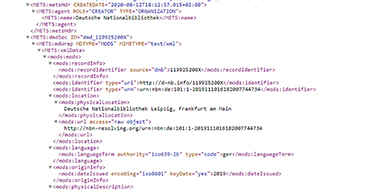Call for applications for DH fellowships

Call for applications for DH fellowships 2024
(The call for applications has already be closed)
As one of Germany‘s great memory institutions, the German National Library (DNB) offers its data and digital collections for science and research as well as for experimental and creative work within the scope of what is legally and technically possible. Therefore, we are offering DH fellowships for research into our freely accessible metadata and collections using text and data mining methods. In addition to a constantly growing stock of title and standard data, these include, for example, 2.6 million freely accessible works and 2.7 million digitised tables of contents of books. The call is primarily aimed at young researchers from all disciplines who have already worked with methods and tools of the digital humanities and have gained practical experience in the field.
The 2024 call for proposals focuses on the DNB's catalogue data with over 27 million data records. These comprehensively represent Germany's literary, scientific and musical production since 1913 and are ideally suited for analysis and exploration using text and data mining methods. The DNB collects everything that has been published in Germany or abroad about Germany or in German since its foundation. Whether printed or digital, whether published by a publishing house or privately: We collect everything! This also includes sheet music and musical works.
Of particular interest for fellowship projects are analyses that examine content-related, temporal or spatial aspects and structures of the publication landscape since 1913. The research questions can, for example, focus on thematic priorities in the entire data corpus, on individual subjects and subject areas, geographical areas and publication types or create publication profiles of selected publishers and scrutinise defined time periods. It is also conceivable to expand the corpus to include data from the Integrated Authority File (GND) in order to investigate social dimensions of the publication landscape, such as gender, age or origin of authors, or to carry out network analyses. Many things are possible - we are looking forward to seeing what research questions the applicants want to address to the data corpus.
Project ideas
In addition, this year we are inviting you to take up one of these project ideas that emerged from the DNB:
Canadian-German Cultural Contact. Transatlantic relations and perspectives
Relations between two countries are characterised by historical contexts. This DH fellowship will examine the German view of Canada in publications from 1913 onwards. How many media works were produced on this topic and what are the thematic focal points that change over time? How is migration to this place assessed?
Cataloguing the Canon - Making publication cycles visible in the DNB catalogue
What information can be drawn from the DNB catalogue on publication cycles? Queries to the holdings and standard data should provide information about canonisation trends. Possible questions include: Which persons or subject headings are most frequently assigned in the humanities/per subject area? Which keyword chains occur most frequently? What information does the link between subject group/keyword/person provide?
Crisis discourses over the course of time
The analysis will focus on the discourses surrounding social crises throughout history. Which crises were dealt with when and how often were they thematised? Which form of publication (non-fiction, research papers) was chosen for the presentation of crises? During what times was there particularly intensive publication on social crises?
Closing provenance gaps from the title database
The original DNB accession books from 1941, 1942 and 1943 were destroyed during the Second World War and important provenance information was lost. Nevertheless, automated procedures are promising for identifying suspected cases of looted property. The aim of the project is to create a corpus of title data for which the publication date differs significantly from the date of receipt and for which it can therefore be assumed that the works do not originate from legal deposit, but from other sources. In a second step, analyses of publishing locations and authors will further narrow down the search.
Basic law conjunctions
The Basic Law for the Federal Republic of Germany was passed in May 1949. The preparatory work began in 1948. Many political ideas from the constitutions of 1848 and 1919 were incorporated into it. In the last 75 years, numerous publications on the Basic Law, its creation, reception and specialised books on all its contents have appeared. From this store of knowledge, numerous insights into the discourses on, for example, civil liberties can be derived. From the question of which topics are reflected on anniversaries, to relevant biographers of the constitution, to analyses of how topics such as women's rights, children's rights, animal welfare, asylum and the environment etc. are reflected in the constitutional debate.
We offer
- a living allowance of EUR 1,250 per month for projects lasting between three and six months
- Support with access to our free data and objects
- project supervision by mentors from the German National Library
- assistance with disseminating and increasing the visibility of research findings, e.g. through the DNB’s website and networks
- networking and dialogue between fellows and with other data experts
- reimbursement of travel expenses for up to three visits to the German National Library
We expect
- a final report at the end of the fellowship in which the research process is described and the applied methods and research results are summarised
- the research findings to be communicated widely and made as accessible as possible to the general public
- an internal (DNB) presentation of the project and its results
We require applicants
- to have a first academic degree (comparable with a Bachelor’s or Master’s degree)
- not to have applied for or be receiving funding from any other organisation for the project submitted
- to devote the majority of their time to the research project during the fellowship period
- to be reliably available for the duration of the scholarship and to report on progress at regular exchange meetings
Last changes:
15.10.2024
Short-URL:
https://www.dnb.de/dhfellowshipcfp
Contact:
DH-Stipendien@dnb.de



